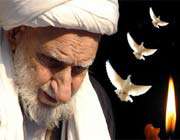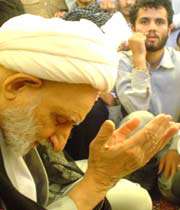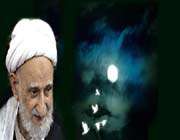Ahlul Bayt in Noah’s Ark
During the month of July 1951 a team of Russian archaeologist experts, were surveying the Valley of Kaaf. Perhaps they were busy in finding a new mine. They noticed a few pieces of rotten wood at a place. The group officer started digging the place. To his surprise he found heaps of wood pressed there under the earth. Experts by observing a few layers speculated that these woods are extraordinary and possess obscure mystery.
They excavated the place with deep interest. They found quite a good amount of wood and many other things. They also found a long rectangular wooden plate. The experts were surprised to observe that this particular plate ad measuring 14” x 10”, was in far better condition among other wood which were on the verge of decomposition, due to aging. After investigation at the end of 1952, experts came to the conclusion that this particular plate belonged to Noah’s Ark, which had rested on the peak of Mount Calff (Judy). And the plate, on which a few words of some ancient language were inscribed, was fixed on the Ark.
After it was proved that the wood found in the excavation are that of the Noah’s Ark, the curiosity as to what was written on the wooden plate was aroused. A board of experts was appointed by the Russian Government under its Research Department to investigate the language of the wooden plate. The Board started its work from the 27th of February 1953. Following were the members of this board:
Prof. Solomon (Sula Nouf), Professor of Languages, Moscow University
Prof. Ifahan Kheeno, scholar in ancient languages, Luluhan College, China
Mr. Mishaou Lu Farug. Officer I/c fossils, manager of ancient monuments
Mr. Taumol Goru, Professor of Languages, Cafezud/Kivzo College
Prof. De Pakan, Professor of ancient monuments, Lenin Institute
Mr. M. Ahmad Colad, Manager of general excavations and discoveries, Zitcomen Research Association
Major Cottor/Kolotov, Head of Stalin University
So these seven experts after eight months of research come to the conclusion that this plate was of the wood used in making Noah’s Ark and that the Prophet Noah had put this plate on his Ark for the safety of the Ark and for receiving favor of God.
In the center of the plate, there is a drawing of a palm shape on which some words of ancient Saamaani language are written. Mr. N. F. Max, Expert, Ancient Languages, Britain (Manchester), has translated the words written on the wooden plate, in English as follows:
“O my Lord, my helper! Keep my hand with mercy and with your Holy Bodies, Mohammed, Alia, Fatima, Shabbar (Hassan) , and Shabbir (Hussain). They are all biggest and honorable.”
The world established for them Help me by their names. You can return to right.
People were surprised to learn these writings. They were surprised as to how this particular plate after centuries of exposition to nature did not decompose but maintained its form. The plate is still preserved at the Center of Fossils Research Moscow, Russia. If you ever have a chance to visit Russia you would be able to see the actual plate, and it will consolidate your faith in Ahl-ul-Bait.
They excavated the place with deep interest. They found quite a good amount of wood and many other things. They also found a long rectangular wooden plate. The experts were surprised to observe that this particular plate ad measuring 14” x 10”, was in far better condition among other wood which were on the verge of decomposition, due to aging. After investigation at the end of 1952, experts came to the conclusion that this particular plate belonged to Noah’s Ark, which had rested on the peak of Mount Calff (Judy). And the plate, on which a few words of some ancient language were inscribed, was fixed on the Ark.
After it was proved that the wood found in the excavation are that of the Noah’s Ark, the curiosity as to what was written on the wooden plate was aroused. A board of experts was appointed by the Russian Government under its Research Department to investigate the language of the wooden plate. The Board started its work from the 27th of February 1953. Following were the members of this board:
Prof. Solomon (Sula Nouf), Professor of Languages, Moscow University
Prof. Ifahan Kheeno, scholar in ancient languages, Luluhan College, China
Mr. Mishaou Lu Farug. Officer I/c fossils, manager of ancient monuments
Mr. Taumol Goru, Professor of Languages, Cafezud/Kivzo College
Prof. De Pakan, Professor of ancient monuments, Lenin Institute
Mr. M. Ahmad Colad, Manager of general excavations and discoveries, Zitcomen Research Association
Major Cottor/Kolotov, Head of Stalin University
So these seven experts after eight months of research come to the conclusion that this plate was of the wood used in making Noah’s Ark and that the Prophet Noah had put this plate on his Ark for the safety of the Ark and for receiving favor of God.
In the center of the plate, there is a drawing of a palm shape on which some words of ancient Saamaani language are written. Mr. N. F. Max, Expert, Ancient Languages, Britain (Manchester), has translated the words written on the wooden plate, in English as follows:
“O my Lord, my helper! Keep my hand with mercy and with your Holy Bodies, Mohammed, Alia, Fatima, Shabbar (Hassan) , and Shabbir (Hussain). They are all biggest and honorable.”
The world established for them Help me by their names. You can return to right.
People were surprised to learn these writings. They were surprised as to how this particular plate after centuries of exposition to nature did not decompose but maintained its form. The plate is still preserved at the Center of Fossils Research Moscow, Russia. If you ever have a chance to visit Russia you would be able to see the actual plate, and it will consolidate your faith in Ahl-ul-Bait.
The Soviet Union has now hidden the plate and it is no longer under public view. Below are pictures from the researcher’s book.
The translation was documented in the following news Papers:
· Weekly - Mirror: U.K., December 28,1953.
· Star of Britain: London, Manchester, January 23,1954.
· Manchester Sunlight: January 23,1954.
· London Weekly Mirror: February 01,1954.
· Bathrah Najaf: Iraq, February 02,1954.
· AI-Huda: Cairo, March 31,1954.
· Ellia - Light, Knowledge, & Truth, Lahore, July 10,1969
From a hadith of our Prophet, the following is quoted:
Prophet Mohammed (S. A. W.) said: “My family is like Noah’s Ark. Whoever embarked on it was saved. Whoever missed it drowned.”







